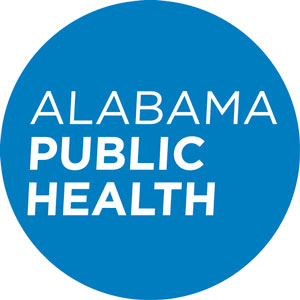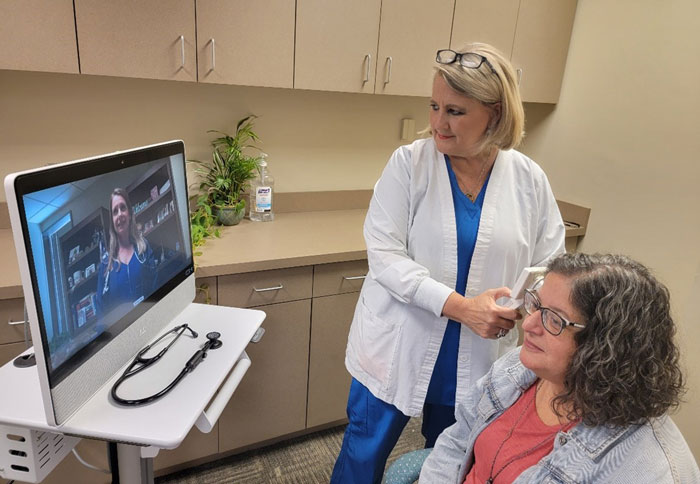ADPH Telehealth Program
- Need: To increase access to healthcare throughout Alabama.
- Intervention: The Alabama Department of Public Health (ADPH) has created telehealth communications at county health departments.
- Results: ADPH telehealth services are currently available in 65 of 67 county health departments.
Description
 Created in 2015, the
Alabama Department of Public Health (ADPH) Telehealth
Program allows patients to visit their nearest county
health department for appointments with specialists in
another city. The ADPH has a video production and
broadcast facility as well as a statewide
videoconferencing network. In addition, the ADPH was able
to purchase the components and build its own telehealth
carts, thereby saving itself significant money in
starting this new program. Currently, 65 county health
departments are equipped with a telehealth cart.
Created in 2015, the
Alabama Department of Public Health (ADPH) Telehealth
Program allows patients to visit their nearest county
health department for appointments with specialists in
another city. The ADPH has a video production and
broadcast facility as well as a statewide
videoconferencing network. In addition, the ADPH was able
to purchase the components and build its own telehealth
carts, thereby saving itself significant money in
starting this new program. Currently, 65 county health
departments are equipped with a telehealth cart.
ADPH staff use the telehealth carts for meetings and training in addition to programs that use it for telehealth appointments such as disease intervention and microscope competency testing. In addition, the ADPH is currently working with the following external partners:
- Alabama Department of Mental Health
- Alabama Lions Sight Conservation Association
- Children's of Alabama (hospital)
- Five Horizons Health Services
- University of Alabama at Birmingham Medical Center (UABMC)
Services offered
ADPH external telehealth partners schedule patients' appointments in cooperation with the appropriate county health department. Travel time for patients is significantly reduced, as the patient is able to have the telehealth encounter with their provider without leaving their county of residence. County health department staff facilitate the appointment and operate the telehealth equipment. Each telehealth cart has the following equipment:
- Handheld examination camera with a general viewing lens, otoscope lens, and dermatology lens
- Bluetooth-enabled stethoscope
- Blood pressure monitor
- Additional equipment is deployed for some specialty clinics such as abdominal and transvaginal ultrasounds, fetal heart monitor, and colposcopy cameras.

Results
When the ADPH Telehealth Program began in 2015, 23 of the 67 county health departments had the bandwidth capacity to conduct telehealth services. Broadband is now available at all county health departments.
The ADPH has designed a second style custom cart that is used exclusively for meetings, training, and telehealth consultations.
The University of Alabama at Birmingham is believed to be the first in the nation to offer dialysis visits via telehealth. For more information about these visits:
- Krishna, V.N., Managadi, K., Smith, M., & Wallace, E. (2017). Telehealth in the Delivery of Home Dialysis Care: Catching up with Technology. Advances in Chronic Kidney Disease, 24(1), 12-16. Article Abstract
To learn more about Children's of Alabama and Alabama Department of Public Health's work with pediatric epilepsy and telehealth:
- Gali, K., Joshi, S., Hueneke, S., Katzenbach, A., Radecki, L., Calabrese, T., … & Bonkowsky, J.L. (2022). Barriers, Access and Management of Paediatric Epilepsy with Telehealth. Journal of Telemedicine and Telecare, 28(3), 213-233.
Challenges
The state of Alabama has not enacted legislation that would provide equitable reimbursement for services taking place in the office or via telehealth. State health departments need state or federal funding for the management, operation, and evaluation of telehealth programs.
Replication
See if your state or region already has an existing telehealth network. Joining an existing network is cheaper and more efficient than starting a new network, establishing originating sites, and buying the needed equipment.
The ADPH's website includes additional resources.
Contact Information
April L. Golson, DirectorOffice of Digital Health
334.206.7924
april.golson@adph.state.al.us
Topics
Public health
· Telehealth
States served
Alabama
Date added
August 2, 2017
Suggested citation: Rural Health Information Hub, 2025 . ADPH Telehealth Program [online]. Rural Health Information Hub. Available at: https://www.ruralhealthinfo.org/project-examples/967 [Accessed 14 February 2026]
Please contact the models and innovations contact directly for the most complete and current information about this program. Summaries of models and innovations are provided by RHIhub for your convenience. The programs described are not endorsed by RHIhub or by the Federal Office of Rural Health Policy. Each rural community should consider whether a particular project or approach is a good match for their community’s needs and capacity. While it is sometimes possible to adapt program components to match your resources, keep in mind that changes to the program design may impact results.
